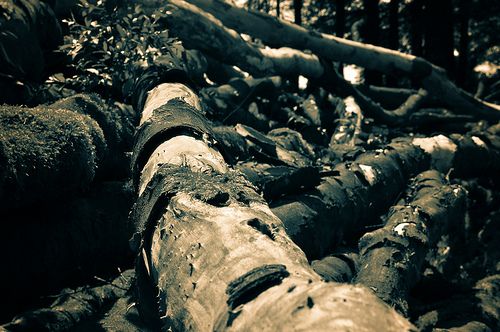 AL JAZEERA– As climate change negotiations come to a close in Cancun, Birginia
Suarez-Pinlac is seeing red. The environmental lawyer from the
Philippines is worried that a plan for Reducing Emissions from
Deforestation and Degradation (REDD) constitutes a land grab,
transferring natural wealth from the poor to the rich under the
auspices of saving the planet.
AL JAZEERA– As climate change negotiations come to a close in Cancun, Birginia
Suarez-Pinlac is seeing red. The environmental lawyer from the
Philippines is worried that a plan for Reducing Emissions from
Deforestation and Degradation (REDD) constitutes a land grab,
transferring natural wealth from the poor to the rich under the
auspices of saving the planet.
Last year, she says, an Australian coal company tried to forge an agreement with an indigenous tribe on Mindanao Island in the Philippines, a poverty stricken area known for its high mountains and lush green rainforest. “The company offered poor tribes people money in exchange for their atmospheric space. They don’t want to cut their own emissions domestically. They want to find a way to profit from the carbon they produce.”
Forests help take climate changing carbon dioxide out of the
atmosphere, reducing global warming – a human induced process linked to
wild weather patterns including this year’s deadly flooding in Pakistan
and crop destroying wild fires in Russia.
Green-washing
The world is losing about six million hectares of forests each year – an area roughly the size of Greece – due to human activities like logging. REDD is supposed to be designed to allow companies to buy clean air credits from people who live in forests to encourage them to protect the trees. But some environmentalists say that when companies buy credits abroad through what is now a voluntary scheme, they feel entitled to pollute back at home.
“The biggest buyers of REDD credits are the worst polluters – big oil and big coal,” says Bill Barclay, the research director for the Rainforest Action Network in California. “They are looking for a cheap ‘get out of jail free card’ – it’s basically green-washing.”
In the Philippines, indigenous people “didn’t understand that they
were giving away their atmospheric space to Australians” when they were
approached by a non-governmental organisation working with the coal
miners, Suarez-Pinlac says.
But REDD and similar initiatives
based on trading credits in carbon dioxide are not just about companies
purchasing environmental legitimacy from communities who actually take
care of forests; the schemes being discussed in Cancun could increase
lucrative business opportunities for hedge fund traders and financers.
“There is a lot of concern REDD will be brought into a carbon offset trading scheme,” Barclay says.
Carbon trading is based on the idea that a price should be placed on emissions. Companies or countries would have a cap set on the amount of pollution they could spew. Those who curtail their emissions below targeted levels could sell atmospheric space to polluters who exceed their limits.
Click to continue reading the full article from Al Jazeera News on the problems with the REDD climate scheme.
article by Chris Arsenault for Al Jazeera News
photograph by flickr user Will Clayton
© COPYRIGHT AL JAZEERA, 2010










